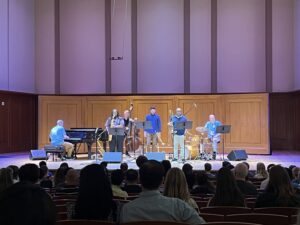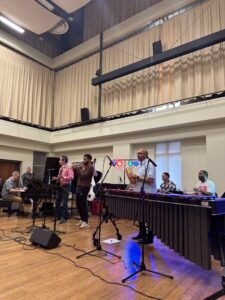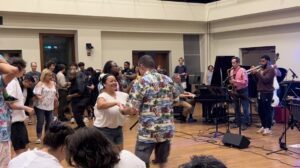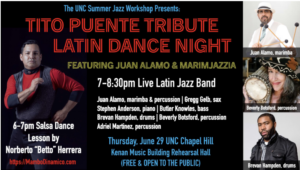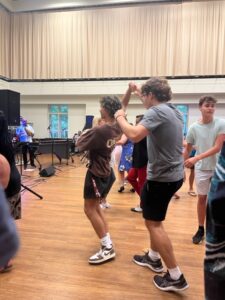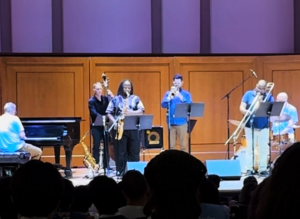
The jazz performance at Moeser Auditorium started at 7 p.m., filling the venue with a palpable sense of nervous anticipation and first-day jitters. As the lights dimmed, the audience eagerly awaited the musical journey ahead.
The first piece, “Open Sesame,” set the stage with an energetic, danceable vibe. Each part was distinct yet seamlessly blended into an upbeat, cohesive sound. Rahsaan Barber’s saxophone solo was particularly notable, with vibrant vibrato adding texture and a “dirty and greasy” feel during the rough, prolonged notes. The mastery of each musician was evident, their passion for music bursting off the sheet music.
Seeing musicians, previously only heard in lessons, demonstrate their artistry was a highlight. The trumpeter’s movement through the harmonic scale was dizzying in a most exciting way. The bassist, Jason Foureman, complemented the work of each of his fellow musicians by serving as the spine of the music.
The second tune, a cha-cha-cha titled “Brooklyn en la Casa,” was sultry and a bit dirty, with Nathan Warner’s trumpet solo inducing a “stank face” among the audience. The music built throughout the piece, making skin crawl in the best possible way and inducing goosebumps in anticipation of a big note.
The third tune continued the sultry and dirty theme. The audience was captivated by the raw emotion and intensity of the performance.
Throughout the performance, the connection between musicians and the audience was profound. Each note, each solo, and each collaboration was a testament to the power of live jazz. The performers brought their personalities into the music, making it not just an auditory experience but a visual and emotional one as well.
The jazz performance at Moeser Auditorium was a night to remember. It wasn’t solely about the music, but rather the shared experience of witnessing the culmination of countless hours of practice and passion.
Performers and Instruments:
- Bass: Jason Foureman
- Drums: Dan Davis
- Piano: Stephen Anderson
- Alto Saxophone: Rahsaan Barber
- Trumpet: Nathan Warner
- Trombone: Jerald Shynett
